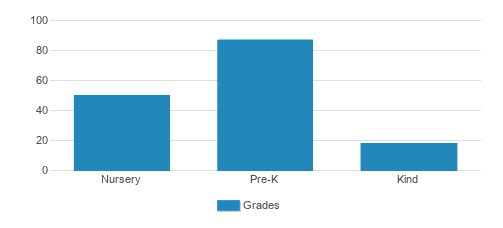The goals of Diablo Valley Montessori School are to offer the community the educational alternative of the highest standard of Montessori education and childcare; build for each child a strong foundation of practical and academic skills; strengthen each child's self-confidence and courage to be creative by offering freedom of self-expression in a prepared environment; help each child to realize his or her full potential as a responsible world citizen; and promote the continued development and training of staff.
The role of the Montessori teacher is to aid children in their natural development and to support them in developing his or her full potential.
This is achieved by carefully observing each child in order to assess and meet their individual needs.
Quick Stats (2025)
- School Type: Montessori School
- Grades: Prekindergarten-Kindergarten
- Enrollment: 201 students
- Average class size: 21 students
- Application Deadline: Jan. 31 / rolling
- Source: Verified school update
School Overview
School Type
School Membership(s)School Assoc.
Religious Affiliation
Grades Offered
Grades Prekindergarten-Kindergarten
ADD/ADHD Support
Yes
Learning Difference Programs
Yes
Year Founded
1965
Summer School Offered
Yes
Summer Program Details
School Calendar
Student Body
Total Students
201 students
Student Body Type
Co-ed
% Students of Color
17%
State avg.: 51%
Students by Grade

Academics and Faculty
Total Classroom Teachers
10 teachers
Student : Teacher Ratio
20:1
National avg.: 13:1
% Faculty w/Advanced Degree
40%
Average Class Size
21 students
Classroom Dress Code
Casual
Tuition and Acceptance Rate
Admission Deadline
Jan. 31 / rolling
Tuition Notes
Ranges from $9,250 to $26,400
School Notes
- The goals of Diablo Valley Montessori School are to offer the community the educational alternative of the highest standard of Montessori education and childcare; build for each child a strong foundation of practical and academic skills; strengthen each child's self-confidence and courage to be creative by offering freedom of self-expression in a prepared environment; help each child to realize his or her full potential as a responsible world citizen; and promote the continued development and training of staff.
- The role of the Montessori teacher is to aid children in their natural development and to support them in developing his or her full potential.
- This is achieved by carefully observing each child in order to assess and meet their individual needs.
Source: Verified school update
Frequently Asked Questions
Does Diablo Valley Montessori School offer a summer program?
Yes, Diablo Valley Montessori School offers a summer program. Visit their summer school page for more information.
When is the application deadline for Diablo Valley Montessori School?
The application deadline for Diablo Valley Montessori School is Jan. 31 / rolling (applications are due on Jan. 31 but additional applications are reviewed year-round as space permits ).
School Reviews
Endorse Diablo Valley Montessori School. Endorsements should be a few sentences in length. Please include any comments on:
- Quality of academic programs, teachers, and facilities
- Availability of music, art, sports and other extracurricular activities
- Academic or athletic awards
Recent Articles

A Parent's Guide To Understanding High School Teaching Methods
This comprehensive guide helps parents navigate the various teaching methods used in today's high school classrooms. By understanding these approaches, you'll be better equipped to support your teen's learning journey, communicate effectively with teachers, and create a complementary learning environment at home.

February 08, 2025
Social Emotional Learning: Education's Hidden SymphonyA musician's perspective on Social Emotional Learning reveals how this educational framework orchestrates success through five essential emotional competencies.

January 24, 2025
A Roadmap For Starting A Private SchoolUse this roadmap as a set of talking points with your trusted mentors and professionals to start the private school of your dreams. You're not alone. Over the years, hundreds of folks like you have had the same dream. From Quintilian to Maria Montessori to Lucy Madeira Wing, visionary educators have established schools to teach according to their beliefs and methodologies.

















